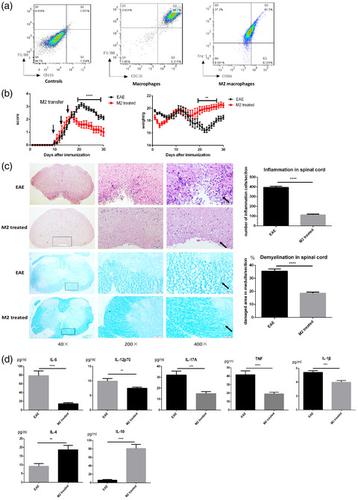当前位置:
X-MOL 学术
›
Clin. Exp. Immunol.
›
论文详情
Our official English website, www.x-mol.net, welcomes your
feedback! (Note: you will need to create a separate account there.)
Adoptive transfer of immunomodulatory M2 macrophages suppresses experimental autoimmune encephalomyelitis in C57BL/6 mice via blockading NF‐κB pathway
Clinical & Experimental Immunology ( IF 3.4 ) Pub Date : 2021-01-11 , DOI: 10.1111/cei.13572 F Chu 1, 2 , M Shi 1, 2 , Y Lang 1 , Z Chao 1 , T Jin 1 , L Cui 1 , J Zhu 1, 2
Clinical & Experimental Immunology ( IF 3.4 ) Pub Date : 2021-01-11 , DOI: 10.1111/cei.13572 F Chu 1, 2 , M Shi 1, 2 , Y Lang 1 , Z Chao 1 , T Jin 1 , L Cui 1 , J Zhu 1, 2
Affiliation

|
Macrophages play important roles in multiple sclerosis (MS) and experimental autoimmune encephalomyelitis (EAE), and M2 macrophage may have anti‐inflammatory effects. In this study, we elucidated the roles of M1 and M2 macrophages in the pathogenesis of EAE and the effects of treatment with M2 macrophages that target certain proinflammatory cytokines and with immunomodulatory preparations that beneficially influence the disease course. We found macrophages increased at the onset of clinical signs in the EAE group, consistent with an increased proportion of M1 macrophages and low numbers of M2 macrophages. As the disease progressed and the symptoms worsened, M1 macrophages decreased and M2 macrophages gradually increased until the peak. In the recovery stage, M2 macrophages gradually decreased. Treatment with M2 macrophages inhibited the nuclear factor kappa B (NF‐κB) pathway, alleviated the symptoms of EAE, reduced inflammatory cell infiltration and demyelination in the central nervous system and decreased the numbers of macrophages in the spleens. BAY‐11‐7082, an NF‐κB blocking agent, could reduce the total number of macrophages both in vivo and in vitro, effectively prevented EAE development and significantly inhibited EAE symptoms in mice. Our study demonstrates that macrophages may play a crucial role in the pathogenesis of EAE, while M2 macrophages have anti‐inflammatory effects. Transfer of M2 macrophages to EAE mice can block the NF‐κB pathway successfully and relieve EAE symptoms. Application of NF‐κB blockers is useful in the prevention and treatment of EAE.
中文翻译:

免疫调节性 M2 巨噬细胞的过继转移通过阻断 NF-κB 通路抑制 C57BL/6 小鼠实验性自身免疫性脑脊髓炎
巨噬细胞在多发性硬化症(MS)和实验性自身免疫性脑脊髓炎(EAE)中发挥重要作用,M2巨噬细胞可能具有抗炎作用。在这项研究中,我们阐明了 M1 和 M2 巨噬细胞在 EAE 发病机制中的作用,以及用靶向某些促炎细胞因子的 M2 巨噬细胞和有益影响疾病进程的免疫调节制剂治疗的效果。我们发现 EAE 组出现临床症状时巨噬细胞增加,这与 M1 巨噬细胞比例增加和 M2 巨噬细胞数量减少一致。随着病情进展和症状加重,M1巨噬细胞减少,M2巨噬细胞逐渐增多,直至高峰。在恢复阶段,M2巨噬细胞逐渐减少。用 M2 巨噬细胞治疗可抑制核因子 kappa B (NF-κB) 通路,缓解 EAE 症状,减少中枢神经系统炎症细胞浸润和脱髓鞘,并减少脾脏中巨噬细胞的数量。BAY-11-7082,一种 NF-κB 阻断剂,可以减少巨噬细胞的总数在体内和体外,有效地阻止了EAE的发展,并显着抑制了小鼠的EAE症状。我们的研究表明,巨噬细胞可能在 EAE 的发病机制中起关键作用,而 M2 巨噬细胞具有抗炎作用。将 M2 巨噬细胞转移到 EAE 小鼠可以成功阻断 NF-κB 通路并缓解 EAE 症状。NF-κB 阻滞剂的应用可用于 EAE 的预防和治疗。
更新日期:2021-01-11
中文翻译:

免疫调节性 M2 巨噬细胞的过继转移通过阻断 NF-κB 通路抑制 C57BL/6 小鼠实验性自身免疫性脑脊髓炎
巨噬细胞在多发性硬化症(MS)和实验性自身免疫性脑脊髓炎(EAE)中发挥重要作用,M2巨噬细胞可能具有抗炎作用。在这项研究中,我们阐明了 M1 和 M2 巨噬细胞在 EAE 发病机制中的作用,以及用靶向某些促炎细胞因子的 M2 巨噬细胞和有益影响疾病进程的免疫调节制剂治疗的效果。我们发现 EAE 组出现临床症状时巨噬细胞增加,这与 M1 巨噬细胞比例增加和 M2 巨噬细胞数量减少一致。随着病情进展和症状加重,M1巨噬细胞减少,M2巨噬细胞逐渐增多,直至高峰。在恢复阶段,M2巨噬细胞逐渐减少。用 M2 巨噬细胞治疗可抑制核因子 kappa B (NF-κB) 通路,缓解 EAE 症状,减少中枢神经系统炎症细胞浸润和脱髓鞘,并减少脾脏中巨噬细胞的数量。BAY-11-7082,一种 NF-κB 阻断剂,可以减少巨噬细胞的总数在体内和体外,有效地阻止了EAE的发展,并显着抑制了小鼠的EAE症状。我们的研究表明,巨噬细胞可能在 EAE 的发病机制中起关键作用,而 M2 巨噬细胞具有抗炎作用。将 M2 巨噬细胞转移到 EAE 小鼠可以成功阻断 NF-κB 通路并缓解 EAE 症状。NF-κB 阻滞剂的应用可用于 EAE 的预防和治疗。











































 京公网安备 11010802027423号
京公网安备 11010802027423号